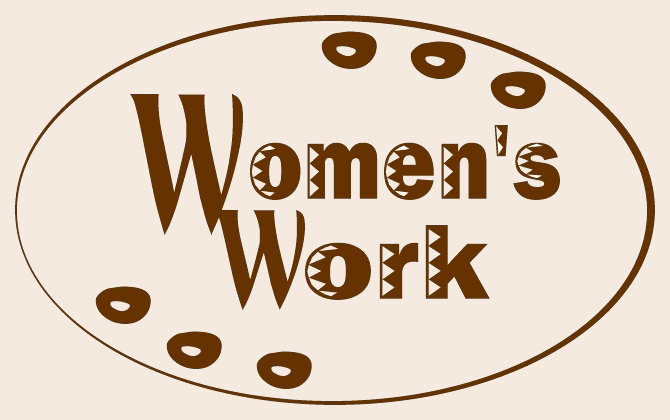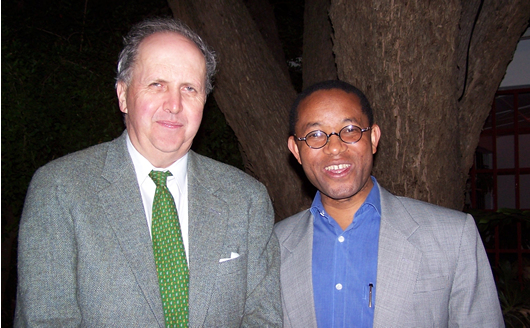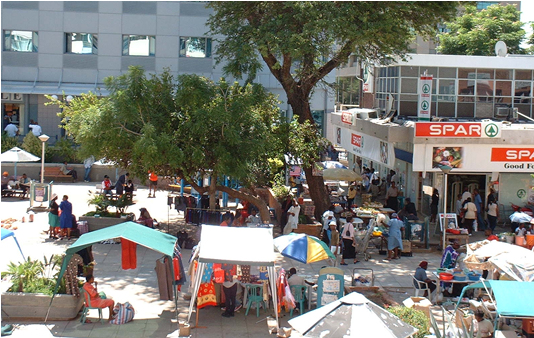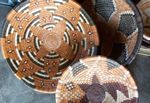
Here's where we're up to- Hope to see you there!
The
launch of our new project:
TrACKS Transferring Ancient Culture, Knowledge and Skills
Helping the San Bushmen to retain their culture
A exhibit of Bushmen Art and Crafts
At Cunneen Hacket Center
12 Vasser Street
Poughkeepsie, NY
on May 10th at 7:00
Patricia of New York recently wrote:
Hello Cecilia, Wow! Thank you for being so responsive to my request
for information on the Mancala game. I am thrilled to have the piece
and as I suspected it has already become a source of conversation
with visitors to our home. Being able to speak a bit more in depth
about its origins makes it all the more interesting. I will tell
you this, the art museum in Loveland, CO hosting the exhibit on
the web sight you sent was only a 15 minute drive from where I lived
in Greeley, CO before moving here to West Point. Of all the museums
to host an exhibit which would offer insight to an obscure piece
of carved wood I bought clear across the country makes it seem as
though the piece was destined to end up in our home. Thank you once
more for such an enjoyable experience shopping with Women's Work.
Patricia
Have a party in our store. We'll close for you to have a bridal party (bridal registery available upon request), a child's birthday party with marionettes, african craft and musical movement, and to hold beading parties using Ostrich Eggshell Beads made by the San women.
FOR ALL NO. 1 LADIES' DETECTIVE AGENCY FANS:
We'll take you on the No. 1 Ladies' Detective Agency tour through an entertaining and informational PowerPoint presentation given by Peter who gave the original tours in Botswana. We'll provide Rooibos Tea and a screening of the making of Alexander McCall Smith's visit to Botswana during the time we lived there in 2003. The evening is Free. We only ask that Women's Work be able to set up and sell some of the beautiful crafts made in Africa. Please email me to schedule your Book Club presentation.
We would like to share an interesting emails with all of you.
Jeannette Margaretha Kinzer wrote a review of the No. 1 Ladies Detective Agency series. Jeannette didn't know this, but while we were living in Botswana we became acquainted with Alexander "Sandy" McCall Smith who's every bit a a charming as our favorite character. Peter eventually began conducting the "Mma Ramotswe Tour" along with Tim Race of African Insight. Tim is married to Dr. Moffet, not the recurring one in the book, but his daughter, Claire. Coincidently, we also became friends with the then Rev. Trevor Mwumba, now actually known as Bishop Mwumba.
We think you'll enjoy Jane's review as much as we did...
The #1 Ladies’ Detective Agency series,
by Alexander McCall Smith

Alexander McCall Smith and the Bishop Trevor Mwumba
Very
often a book is popular for no apparent reason. You need only look
at bestseller lists on any given week to see this. Many of the
books on these lists can barely even be called literature. This
is emphatically not the case with Alexander McCall Smith’s “NO.
1 LADIES DETECTIVE AGENCY” Series, which has appeared on bestseller
lists worldwide. These books are not only extremely popular among
a wide variety of people. They are also a joy to read. On their
pages are many moral lessons told through the simple life of an
ordinary woman in

A View from the Veranda of the President's Hotel
McCall
Smith writes from the perspective of Mma Precious Ramotswe, a traditional
Batswana woman (and “traditionally built”) who runs a detective
agency in the capital city of
Along with her assistant Mma Makutsi, Mma Ramotswe pursues many captivating and illuminating cases in her role as detective. She is the conscience of the book and we come to know her and love her as our thoughts mingle with hers. Mma Makutsi is also a very colorful and vividly drawn character, with her large round glasses and her tendency to look down at her shoes for advice. (The shoes’ usual response is something like, “Don’t look at us boss….You’re such a liar, boss.”) Other prominent players include Mr. J.L.B. Matekoni, owner of a car repair shop in Gaborone, and his two hapless assistants, as well as the formidable Mma Potokwane, matron of a home for orphans. There are many tales of both personal and professional lives, all the time interwoven with delectably dry insights into the Batswana mentality.
As
you begin to read the books you understand immediately why McCall
Smith writes from a woman’s perspective. He depicts women in
Despite
the overall lightness of these books, McCall Smith does not neglect
to tell us of the problems
There are examples of fine and responsible men in these pages, but most are depicted as easily manipulated and too self-absorbed to see the world through Mma Ramotswe’s more perceptive eyes. As one of the characters, Mr. Radiphuti, muses in one hilarious section, “...he had questioned her statement that men had, in general, fewer abilities than women. She had said that his time was ‘over’ and that men like him would be swept aside by feminism. But if men were to be swept aside, wondered Phuti Radiphuti, then where would men be put? Would there be special homes for them, where they could be given small tasks to perform while women got on with the important business of running things? Would men be allowed out of these homes on selected outings (accompanied, of course)? For some days after he had listened to the interview, Phuti Radiphuti had worried about being swept aside, and had experienced a vivid and uncomfortable dream - a nightmare really - in which he was indeed swept aside by a large feminist with a broom.”
But
the central male character in the book, Mr. J.L.B. Matekoni epitomizes
the goodness of many men in
Although refreshing breezes blow though your mind as you read these light, spare and airy sentences, the books are full of pronouncements on moral behavior. These pronouncements cannot help but give some of us pause as we think about our daily lives and how we spend them. How often do we think about others? Do we truly care about them? How can we care if we do not communicate with them on a daily basis on a person-to person level? If we communicate at all it is often by cell phone or email, which cannot possibly help us feel compassion for our neighbors, whether they are close by or on the other side of the world. People’s daily conversations in McCall Smith’s books reflect their deep and sympathetic understanding of each other. “So it was in Botswana, almost everywhere; ties of kinship, no matter how attenuated by distance and time, linked one person to another, weaving across the country a human blanket of love and community. And in the fibres of that blanket there were threads of obligation that meant that one could not ignore the claims of others. Nobody should starve; nobody should feel that they were outsiders; nobody should be alone in their sadness.” Communication starts between two people: husband and wife, brother and sister, friend and foe. Only through such communication can we feel what others feel, thereby achieving the understanding and love of our brothers and sisters which seems rarer and rarer in today’s world.
There is, however, no preaching in these books. They are a simple joy to read, these funny tales. The value of that delight cannot be overestimated. Those who read for sheer pleasure and amusement will be engrossed by these tales of Mma Ramotswe and her circle of friends and family.
What
is it about McCall Smith’s words that so calm me? In reflecting
on that question, my thoughts turn to Willa Cather. Both authors
evoke similar feelings. Both take us back to a time and place when
the land and the sky were the most important things to people.
In reading Cather describing
This
is the same feeling McCall Smith evokes. You can feel the warm
winds coming in off the Kalahari and feel the baked and parched
ground before the rains come. Readers can see and understand his
characters. His stories, like Cather’s, are built around ideas
of morality, but he transmits these ideas gently, usually through
the character of Mma Ramotswe. His words are so clear and light
and pure that everything he says seems right and logical. His view
of our duty to help others as reflected in his characters gives
us good reason to believe that this is why we are here on this earth.
If what he says about the pure goodness that shapes life in
It makes us happy to know that this symphony of instruments that make up Botswana is being played even now endlessly and wondrously. McCall Smith tells us so with passages like this: “Mr. J.L.B. Matekoni walked across the field, the dust on his shoes, the dried mealie stalks cracking under his feet. The earth was generous, he thought: sand and soil could be persuaded, with a little water, to yield such life, and to make such good things for the table. Everything depended on that simple generosity: trees, cattle, pumpkin vines, people - everything. And this soil, this soil on which he walked, was special soil. It was Botswana. It had made the very bodies of his people; of his father, Mr. P.Z. Matekoni, and his grandfather, Mr. T. Matekoni, before him. All of them, down the generations, were linked by this bond with this particular part of Africa, which they loved, and cherished, and which gave them so much in return. Most of us think of Africa as hot and dry, plagued by poverty, hunger, disease and civil conflict. These books help us transcend that stereotype. The traditional people of Botswana seem strong of character, with deep feelings for their country emerging from their love of the land and the cattle that graze on it. Mma Ramotswe, as always, captures the essence of this emotion: "A few visitors, clad in khaki with field guides stuffed into pockets, sat at tables set out on the platform in front of the restaurant. At one table, a woman smiled at Mma Ramotswe and waved, and she returned the greeting warmly. It pleased her to see these visitors, who came to her country and seemed to fall head over heels in love with it. And why should they not do this? The world was a sad enough place and it needed a few points of light, a few places in which people could find comfort, and if Botswana was one of these, then she was proud of that. If only more people knew, thought Mma Ramotswe. If only more people knew that there was more to Africa than all the problems they saw. They could love us too, as we love them." And again, “She moved, so that now they were standing arm in arm; two ladies, she thought, a brown lady from Botswana and a white lady from somewhere far away, America perhaps, somewhere like that, some place of neatly cut lawns and air conditioning and shining buildings, some place where people wanted to love others if only given the chance.” I may never be able to go to Botswana, but reading these books shows me that this wonderful world exists today. It offers us a chance to contemplate both our past and our future. McCall Smith tells us that Botswana is “a beacon of light in Africa, a country of integrity and generosity in both the simple and the big things.” Archaeologists believe that we are all descended from a small group of Africans. If this is true, then all of our roots are in Africa. It is our mother. McCall Smith brings us as far back as we can go to a time when love of land and sky--and other people--was what made our lives complete.
africa africa africa
Jeannette Margaretha Kinzer
©2006, 2007, 2008 Womens Work All rights reserved






